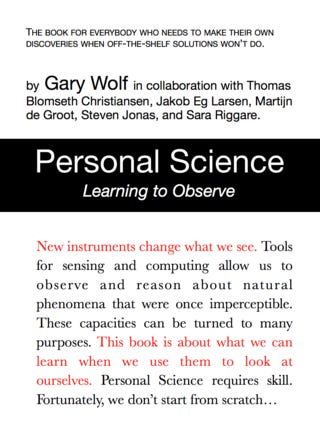Personal Science Week - 26 May 2022
The new Personal Science book, is smoking really all that bad, what's a single sample worth, and more
A new Personal Science book
NEO.LIFE just published my review of Personal Science: Learning to Observe, a new book by Gary Wolf and collaborators. Unlike the generalized, one-size-fits-all advice in many self-help books, these authors provide an overall framework for how to think like a personal scientist. Using dozens of examples of real people solving real problems, the book is the best overview I’ve seen for the methods and techniques you can use to learn for yourself. Highly recommended.
Is smoking really that bad?
There are clear associations between disease and a host of behaviors, but even in the most cut-and-dried cases, the associations are weaker than you’d think.
Take cigarette smoking, for example; probably the most well-established example of a bad behavior. If you smoke, your odds of a health problem are much higher than for anyone else. How high?
A heavy smoker has an age-standardized all-cause mortality rate of 45 per 10,000, much higher than the 19 rate for a non-smoker. Sounds pretty bad, and it is. Rarely does an optional behavior choice cause such dramatic differences in health.
But 45 out of 10,000 isn’t even half a percent chance of dying in a given year. Given that you’re going to die of something anyway, the odds that you’ll be done in by smoking are relatively small.
The point isn’t that you should go ahead and start smoking. After all, these numbers are just averages, collected over millions of people. It’s quite possible that you are one of the 45, in which case who cares about the average.
You can spend a lot of effort on special diets, exercise, supplements or more, but you’ll almost always find that on average the benefits are pretty small. Finding what works for you on the other hand, is way more useful. That’s the point of Personal Science.
What is a genetic sample worth?
How much is a single genetic sample worth? The DTC genomics company LunaDNA made these estimates in an SEC filing:
In 2018, the pharma company GSK paid $300 million for exclusive access to the tens of millions of genetic samples collected by 23andme. That’s a lot of money, but even if they split it with you, your share is trivial.
At a maximum of around $20, your personal data is worth much less to others than it is to you.
About this newsletter
Personal Science is the process of using the scientific method to solve problems and get better results on an individual, personal level. Following the motto of the Royal Society, established in 1660, nullius in verba, we take nobody’s word for it.
This newsletter is a weekly summary of a few observations we think will be interesting to anyone who wants to be a personal scientist. Press the button below to share a (free) subscription with others.


